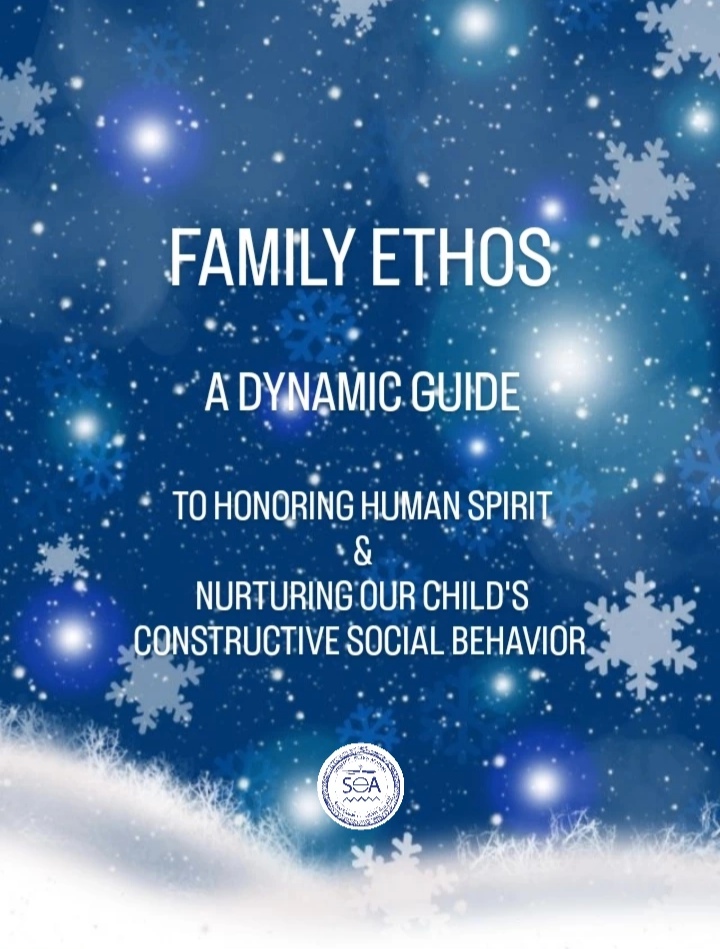

Family Ethos is the collective set of values, principles, and beliefs that form the foundation of a family’s identity. It goes beyond individual preferences, the shared vision and character that guide decision-making and interactions within the family, to encompassing the human spirit by embracing empathy, compassion, and a deep understanding of the interconnectedness of humanity. Establishing a clear and dynamic family ethos provides a roadmap for instilling humanitarian qualities and a constructive social behavior in children.
This holiday season can serve as an influential environment for instilling and enhancing social ethics in children. Guided by the collective spirit and values, this approach to parenting dynamics is designed to light the path toward cultivating a strong family ethos, and contribute positively to the broader social fabric laying the groundwork for compassionate and socially responsible individuals.
In the heart of this guide subsists the belief that by actively engaging in intentional, thoughtful and selfless practices, families can create an environment that inspires empathy, kindness, and a shared commitment to ethical living. Read more to explore 10 of the most innovative approaches to weave the human spirit virtues into the soul’s fabric during the holiday season.
- “Family Values” Collage: In purpose of developing a Family Mission Statement that concisely encapsulates the shared goals, aspirations, and values of the family, begin by collectively identifying and defining the core values and principles that will form the foundation of the Family Ethos. Discuss the significance of each value and how it contributes to the overall well-being of the family. You may ask each family member to choose images or words that represent values important to them, such as kindness, honesty, empathy, responsibility, or gratitude. Compile these into a visual masterpiece that serves as a daily reminder of the family’s shared ethical principles. This collage, serving as the family values statement shall become a touchstone and reminder of the collective commitment to nurturing the human spirit and promoting positive social behavior.
- “Acts of Kindness” Calendar: Explore the role of family rituals in reinforcing the Family Ethos, from daily routines to special occasions, rituals provide opportunities for reflection, connection, and the reinforcement of shared values, by means of creating ceremonies that emphasize kindness, gratitude, and mutual support. Each day, family members can unveil a new kind deed to perform, fostering a spirit of generosity and compassion. This could include social volunteering, writing appreciation letters to elders and family members, or leaving positive notes or kind gestures for neighbors. Such established traditions play a crucial role in solidifying family ethos, whether through regular family meetings, shared celebrations or reflective practices, creating a sense of continuity and reinforcing the values that define the family.
- “Joy of Giving” Activities: Families can occasionally turn holiday cooking into a lesson in empathy by involving children in the preparation of meals for a family in need or a local shelter or community center. Discussing the importance of expressing compassionthroughsuchactivities that reflect simple means of sharing and caring, offers opportunities for open communication and collective goal-setting, fostering a sense of unity and purpose, and forming not just meals but the very essence of familial bonds and social responsibility.
- “Gratitude Jar”: Not just during the holiday season, but throughout the upcoming year, encourage all family members to mark down moments of gratitude, and acts of kindness they’ve experienced or witnessed. Share these notes during family gatherings, reinforcing the importance of acknowledging and appreciating the positive aspects of life.
- Conscious “Gift Giving”: Transform the gift-giving tradition by encouraging socially conscious choices. Research and select gifts that support charitable causes, fair trade practices, or eco-friendly initiatives. Discuss the impact of these choices, teaching children that their consumer decisions can contribute to positive social change.
- Storytelling Sessions: Foster open communication by regularly engaging in discussions centered around moral and ethical dilemmas. Families can either pose hypothetical scenarios or explore real-life examples, encouraging children to express their perspectives and develop critical thinking skills in the process. You may use classic fables, folktales, or even create family stories that highlight the importance of honesty, integrity, and empathy. Most importantly, mutually engage in open discussions about the characters’ choices and their consequences, whilst encouraging children to reflect on their own values.
- “Ethical Decision-making” Games: Introduce games or scenarios that prompt ethical decision-making discussions by creating hypothetical situations that challenge children to consider the ethical implications of their choices. This interactive approach allows for practical understanding and application of ethical principles. You may engage in role-playing or collaborative problem-solving activities, which allow children to practice making ethical decisions in a safe and supportive environment, hereby reinforcing the skills needed to navigate real-life situations. Similar dynamic exercises can instill a sense of moral responsibility and ethical awareness in a hands-on and engaging manner.
- “Cultural Appreciation” Discuss how different cultures celebrate the holiday season, emphasizing the values of tolerance, understanding, and respect for diversity. Encourage creative expression as a means of articulating and reinforcing the family ethos, whether through art, music, or storytelling. This proactive approach provides opportunities for family members to express their understanding of shared cultural values and the impact they have on their lives.
- “Journaling” Journey: Provide each family member with a journal to document their ethical reflections and resolutions. Set aside time for family members to share excerpts from their journals, promoting self-awareness and creating a space for open dialogue about personal growth and ethical development. By actively involving children in the ongoing dialogue about family values, parents can demonstrate that ethical principles are not static but require continuous reflection and adaptation. This dynamic approach encourages children to internalize values as a living part of their identity.
- Achievements “Visual Tracker”: Creating a visual tracker to certain number of kind initiatives or deeds performed throughout the year allows the family to celebrate its members’ adaptive behavior and achievements, emphasizing the ongoing commitment to making a positive impact in the community and instilling a sense of social responsibility in children. It is significant to discuss the impact of these actions on both individuals and the community and plan to undertake further activities that cultivate empathy by exposing the family to diverse perspectives and experiences. This could involve volunteering together, engaging with different cultures, or participating in community events that promote understanding and compassion.
Concisely, family ethos extends beyond the boundaries of the home as it influences the broader community. Children who are raised within a family guided by a strong ethos are more likely to become positive contributors to society. The values instilled at home serve as a compass that guides their interactions, relationships, and contributions to the well-being of the larger community. By embracing the dynamic nature of Family Ethos, parents can actively shape the character and values of their children, preparing them to navigate the world with compassion, integrity, and a genuine commitment to positive social behavior.
It is noteworthy to recognize that family dynamics evolve over time, and as children grow, so should the family ethos, and the need to provide guidance on adaptive ethical discussions, activities, and expectations to align with the changing needs and perspectives of family members. By embracing the dynamic nature of family life, parents can empower their children to navigate the complexities of the world with compassion, integrity, and a commitment to positive social behavior. In doing so, families become not only a source of support for individual members but also a force for positive change in the broader community.
